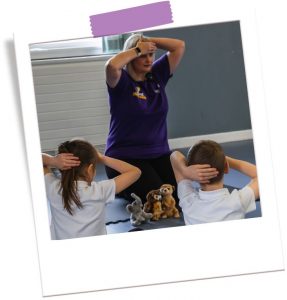
How to help children overcome fears
October 30, 2025
Is it really flexible? Here’s how the licence fits into your week
November 6, 2025Do you have moments when you think I need to stop and press the reset button? It’s the same for both kids and adults, and when stress creeps up on us, taking a sensory brain break is helpful.
A brain break is basically a way of telling your brain, “Chill out for a minute!” When kids are stressed, their brains can get stuck in overdrive. Taking a break with movement or hands-on activities is like hitting the reset button, giving their brains a chance to shake off the stress.
Resetting the brain helps children de-stress and re-center. Any activity that fully engages their senses and immerses them in their environment can serve as a sensory break. They need movement, action, and something to do with their hands to focus better or simply take themselves out of stressful situations.
How does stress manifest in children?
Stress in children can show up in a variety of ways: difficulty sleeping, emotional outbursts, avoidance of challenges, risk-taking behaviours, withdrawal, impulsivity, or even changes in eating habits. Anxiety or unresolved stress doesn’t have a single face—it’s unique to every child.
Parents often ask, “How can I help my child handle stress?” The simple answer: Let them play! It’s not about fancy toys or organised activities—it’s about letting them explore, imagine, and just be kids. Bonus: it might even buy you five minutes of peace (or at least enough time to finish your coffee while it’s still hot).

Why is sensory play so important?
Because sometimes kids just need to squish something to feel better! Play is like a magic reset button for children—it helps them work through tricky emotions and challenges without even realising they’re doing it. Think of it as their way of saying, “Wait a minute, world, let me figure this out.”
Play gives kids a safe space to make sense of confusing situations or big feelings while still learning and growing. Even better, it pulls them out of that stressy hamster wheel in their heads and anchors them firmly in the present. Instead of worrying, they’re busy exploring, imagining, and maybe even getting a little messy (looking at you, slime lovers).
Sensory play is the superstar here. Whether it’s the feel of sand between their fingers, the squish of playdough, or the calming sound of nature, engaging their senses helps children switch off their anxious minds and get grounded.
During Mind Marvels’ sessions, we mix brain games with mindful movement to keep kids engaged, stress-free, and ready to take on whatever the day throws their way—because who says learning mindfulness can’t be fun?
Play gives kids a safe space to make sense of confusing situations or big feelings while still learning and growing.
Sensory brain break activities for kids
Here’s the fun part! These simple, sensory-rich activities will help your child de-stress while sneaking in a bit of learning along the way. Plus, they’re all easy to set up at home or in schools—no Pinterest-level crafting required!
- Play with play dough or clay
Who doesn’t love a good squish? Play dough or clay is perfect for little hands to knead, roll, and shape. This hands-on activity strengthens fine motor skills, encourages creativity, and provides a calming outlet for stress. Bonus: you can join in and pretend you’re making “modern art.” - Take photos
Give your child a camera (or the “safe-to-drop” family phone) and let them snap away! They can take pictures of their favourite toys, pets, or the strangest things they find in the garden. It’s a great way to focus their attention, spark creativity, and help them see the world from a new perspective—literally! - Go on a nature walk and listen for sounds
Turn a walk into an adventure by listening for birds, wind, or crunchy leaves. It’s mindfulness in action, disguised as fun. This activity grounds kids in the present and teaches them to slow down and appreciate their surroundings. Plus, it’s a great excuse to play “What’s that sound?” - Walk like different animals
Tell your child to stomp like an elephant, hop like a frog, or slither like a snake. It’s silly, yes, but it helps with body awareness, coordination, and burning off that extra energy. Bonus points if you can keep a straight face while trying it yourself. - Help make food and smell and taste each ingredient
Turn snack time into sensory time! Let your child smell spices, roll dough, or taste-test veggies. Not only does this boost sensory exploration, but it also teaches them about healthy eating and helps picky eaters feel more adventurous. - Throw, catch and bounce a ball
A classic for a reason! Whether it’s tossing a beach ball or bouncing a tennis ball off the wall, this simple activity improves coordination, motor skills, and focus. And, of course, it’s brilliant for getting out a bit of that pent-up energy. - Read a rhyming book or create your own rhymes
There’s something magical about rhyming words—it’s like music for the brain. Reading rhyming books or coming up with silly rhymes together builds language skills and gives kids a chance to giggle their stress away. (“There once was a frog who sat on a log…” You’re welcome.) - Colour patterns
Grab some colouring pencils and let your child create patterns or designs. The repetition and focus are super calming, and you get bonus relaxation points if they stay within the lines (but no pressure!). It’s screen-free downtime that helps kids de-stress. - Play with sand and shovels
Whether it’s in a sandbox or a tray on the kitchen table, sand play is a sensory goldmine. Kids can dig, pour, and build to their heart’s content while developing motor skills and enjoying a meditative, hands-on experience. (Pro tip: keep a dustpan nearby!) - Make texture cards with different materials
Pull out bubble wrap, fabric scraps, sandpaper, or anything else you have lying around. Let your child glue these onto cards to create a tactile masterpiece. Not only is this activity great for exploring textures, but it also strengthens focus and creativity—and who doesn’t love popping bubble wrap?
By incorporating these sensory brain-break activities, we can equip children with the tools to manage stress, build resilience, and navigate life’s challenges with confidence and calm.
